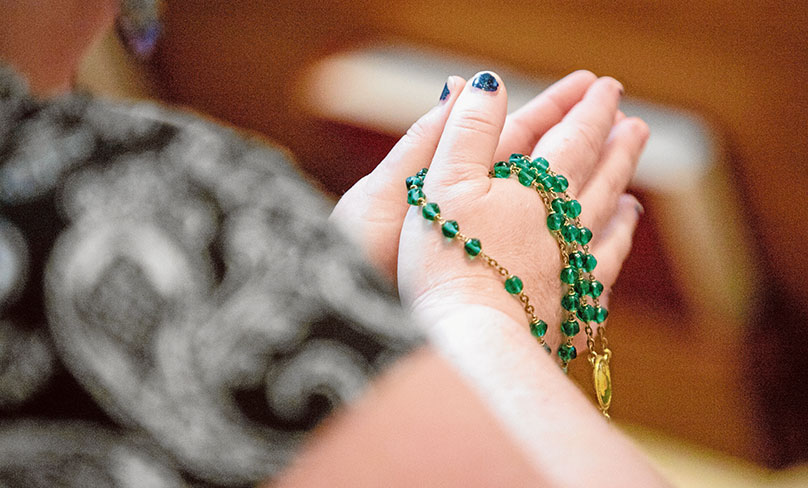
Dear Father, I was somewhat surprised to hear that Pope Francis has asked all Catholics to pray the rosary each day in October followed by the Prayer to St Michael the Archangel and the prayer “Sub tuum praesidium” to Our Lady. Can you tell me what is behind this?
I too was surprised but very happy to hear that the Pope has asked for these prayers. What is behind it is simply that, as we are well aware, the Church is going through troubled times, seen above all in the reports of widespread sexual abuse by priests and others in the Church. The Vatican press release in which the Holy Father asked for these prayers said that we are to ask Our Lady and St
Michael “to protect the Church from the devil, who always seeks to separate us from God and from each other” and it referred to “moments of spiritual turbulence”.
As we recall, the situation in the Church was such that it moved the Pope to write a Letter to the People of God on 20 August this year inviting the whole Church “to a penitential exercise of prayer and fasting” which “can awaken our conscience and arouse our solidarity and commitment to a culture of care that says ‘never again’ to every form of abuse.”
Now the Holy Father has asked in particular that we pray the rosary every day in the month of October, followed by the two prayers you mentioned. October is the month of the rosary, as proclaimed by Pope Leo XIII in his Encyclical Supremi Apostolatus of 1 September 1883.
In view of the many dangers afflicting the Church at that time, Pope Leo asked that the rosary and the Litany of Loreto be recited each day of October that year in every parish church throughout the world (cf. J. Flader, Question Time 1, q. 132). What Pope Francis has asked for now echoes that petition of 135 years ago, since once again the Church is experiencing special difficulties. The rosary is a very rich prayer and, independently of the circumstances in which we say it, it always benefits us enormously so let us take up this request of the Holy Father.
We should not forget that from 3-28 October the Synod of Bishops is meeting in Rome to discuss the important topic of young people, the faith and vocational discernment, so we can add that as an important intention for our prayers this month.
As for the prayer to St Michael the Archangel, again it was Pope Leo XIII who gave it to the Church. One day while attending a Mass of thanksgiving he saw evil spirits gathering over Rome and he had a vision of God granting Satan the choice of a century in which to do his worst work against the Church.
The devil chose the twentieth century. Greatly disturbed, the Pope wrote the prayer to St Michael the Archangel and in 1886 he ordered it to be said all over the world after every Mass. The prayer was said until 1964, when it was no longer required. Nonetheless, on 24 April 1994 Pope St John Paul II recommended that the faithful continue to say it “to obtain help in the battle against the forces of darkness and against the spirit of this world” (cf. J. Flader, Question Time 1, q. 137).
Pope Francis has spoken about the devil repeatedly from the earliest days of his pontificate (cf. J. Flader, Question Time 3, q. 307) and on 5 July 2013 he consecrated the Vatican to St Michael and blessed a new statue of him in the Vatican gardens. The idea for the statue had come during the pontificate of Pope Benedict XVI, who was present for the blessing.
On that occasion Pope Francis said: “In consecrating the Vatican City State to St Michael the Archangel, let us ask him to defend us from the Evil One and cast him out.” So in these special times let us take up the Pope’s plea and say the prayer to St Michael with fervour.
As for the prayer “Sub tuum praesidium”, it is one of the most ancient prayers to Our Lady, having been found on an Egyptian papyrus dating to the third or fourth century. It is one of the Marian hymns that may be used after Night Prayer in the Liturgy of the Hours. It reads: “We fly to thy protection, O Holy Mother of God; despise not our petitions in our necessities, but deliver us always from all dangers, O Glorious and Blessed Virgin.”
If we take up this petition of the Holy Father and say these prayers, we will grow in love for the Church and help her greatly and we will grow in holiness at the same time.
